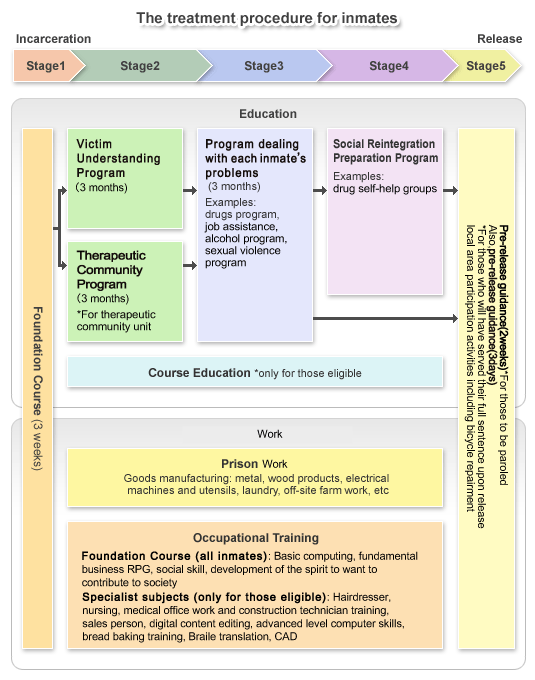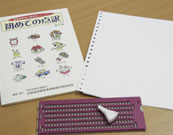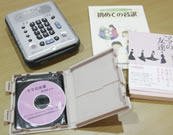Home > Rehabilitation Programs
Towards a lifestyle which avoids reoffending and causing harm to oneself or others
The greatest priority at Shimane Asahi Rehabilitation Program Center is to prevent reoffending by the prisoners and we are dealing with this by taking many diverse initiatives. With the help of the local nature, industry and culture, we are actively putting into practice measures that provide support for the inmates after they are released. For example, we provide effective support for the inmates’ post-release employment through an educational program which offers a wide variety of occupational and work training and thoroughly promotes conversion away from criminal behavior.
■The treatment procedure for inmates
We structurally coordinate classification and education groups from incarceration to release and we take measures to integrate assessment, care and rehabilitation. In addition, through a classifying work support system developed uniquely at Shimane Asahi Rehabilitation Program Center, all kinds of data on the inmates are joined together and information is shared between staff.

■Work/Occupational Training
With the help of the local community, we aim to create a system which can guarantee the continuance of prison work by using the prison work system to put life into local revitalization.
In order to foster a feeling of closeness to nature's four seasons, at this center we are also carrying out farm work.The inmates cultivate roses and other plants in greenhouses located in prison. They are also engaged in agricultural activities outside prison, that is, at Shinkai Park and a local pear orchard , At Shinkai Park, about 30 inmates grow tea leaves, vegetables, and mulberry leaves under the guidance of local farmers.
Special units' inmates are engaged in other activities, including making masks for ancient Shinto singing and dancing, which is a traditional local performing art. They also make Sekishuu paper and Iwami-style ceramics, which are traditional local handicrafts, with the cooperation of local welfare organizations, paper workshops and potteries.
All inmates receive the foundation course of occupational training and are then able to choose advanced courses. The foundation course includes "business RPGs" to learn fundamental knowledge about commercial transactions and bookkeeping, "basic computing" and other things. We provide advanced courses such as hairdresser training, in which a local hairdresser training school gives them the knowledge and skills, nursing, medical office work, bakery training, advanced computing, digital contents editing and others.
As part of the Digital Contents Editing course, inmates can learn the knowledge and skills required for editing the images used in homepages as well as editing education-related video contents. The Advanced Institute of Industrial Technology is involved, developing teaching materials and engaged in teacher training. It is a ground-breaking program in which industry, academia and government cooperate each other.
 Horticultural Therapy Garden
Horticultural Therapy Garden
 Making masks for Iwami-style ancient Shinto singing and dancing (image)
Making masks for Iwami-style ancient Shinto singing and dancing (image)
 Shinkai Park
Shinkai Park
 Computer Courses
Computer Courses
 Hairdressing
Hairdressing
 Bakery
Bakery
■Education
We provide programs which have been proven to reduce the recidivism rate in Europe and the United States. Education at the facility aims to change the inmates criminal behavior and attitudes to society. In education, we stress three important aspects: therapeutic community, through which inmates learn from each other; cognitive behavioral therapy, which aims to motivate inmates to effectively transform their values which caused them to commit crime; and restorative justice, which provides support to enable inmates to learn about making amends for harmful acts and about how to accept responsibility.

■Job Assistance
We provide job assistance guidance in cooperation with job-placement offices. In addition, Shimane Asahi Rehabilitation Program Center has been authorized by Ministry of Health, Labor, and Work to provide a free job placement service in January 2014, which was the first authorization for prison. We are trying to have inmates to be interviewed for a job and to get a job offer in prison. Some business firms began helping ex-inmates by job offer in prison. Some business firms began helping ex-inmates be providing not only job opportunities but comprehensive living assistance for rehabilitation like parents, which we call Shoku-shin(job & parent) project.
In 2016, CORE-works were established in Tokyo and Osaka Regional Correction Headquarters. CORE-works collect the information of prisoners nationwide who want to work after release, and provide those data to the companies which consider employing prisoners after their release.
■Contributing to Society
We foster among the inmates a feeling of atonement by conducting educational activities whereby inmates contribute meaningfully to society. We think it extremely important that inmates should feel like part of a community when they return to society and should hope to play a useful part in that society. Shimane Asahi Rehabilitation Program Center has put in place a guide dog puppy raising program, thanks to the cooperation of the Japan Guide Dog Association. This program involves the raising by the inmates of puppies which are potential guide-dogs. The puppies reared for about 10 months between the ages of 60 days and one year. The inmates taking part in this program spend 24 hours of the day with their dog, feeding it, exercising it, as well as training it, including toilet training. The inmates have the puppies understand the rules of human society, and build a good relationship with peple. The aim of this program is to foster in inmates a mind that cherishes life, and to have them experience the joy of contributing to society.
In addition to this, we also carry out the follows in order to contribute to society, especially local communities: Braille translation and transcription activities; abandoned bicycle restoration activities to provide developing countries; outer road and nearby facilities cleaning activities.
 Guide Dog Puppies
Guide Dog Puppies
 Braille Translation
Braille Translation
 Transcription
Transcription
■Special Units
Inmates with physical, intellectual or mental handicaps can receive a wide variety of programs that meet their specific needs, such as occupational and physical therapy, group psychotherapy, SST (social skills training) and introspection programs.
